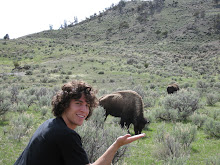God tested Abraham. He said to him, "Abraham!" And he said, "Here I am." He said, "Take your son, your only son Isaac, whom you love, and go to the land of Moriah, and offer him there as a burnt offering on one of the mountains that I shall show you."
Abraham replied, "So you want me to take my only child, who took over ninety years for my wife and I to conceive, and you want me to burn him alive as a sacrifice to you?"
God said, "Yes."
"Are you f@#$^&* crazy?" Asked Abraham.
"No, and I don't appreciate that tone Abraham! You owe me, and if you don't sacrifice your son to me I'll do something REALLY BAD. I'm not kidding, I'll send a lightning bold on a bee-line to your face. As a matter of fact, just for questioning me, I have created cancer. Question me one more time, go on, see what happens."
"I don't even know what cancer is, what do I care? You're asking me to kill my son for no reason."
"That's it!" God replied. "I have just laid the foundations for humanity to invent something called a nuclear weapon. This will enable man to virtually destroy the Earth and everything within it. Now what say you?"
Abraham paused and reflected for a moment. Finally, he said, "Ok, I'll do it. But you're a dick."
Abraham took the wood of the burnt offering and laid it on his son Isaac, and he himself carried the fire and the knife. So the two of them walked on together. Isaac said to his father Abraham, "Father!" And he said, "Here I am, my son." He said, "The fire and the wood are here, but where is the lamb for a burnt offering?"
"I have never hated myself so much." thought Abraham. Abraham answered Isaac, "God himself will provide the lamb for a burnt offering, my son."
When they came to the place that God had shown him, Abraham built an altar there and laid the wood in order.
As Abraham prepared for the sacrifice, his thoughts tormented him. Never before had he faced such a high mountain to climb, and the feat threatened to consume him. Thoughts entered his mind on how to escape such a fate and save his son.
"I could sacrifice myself." Thought Abraham. "Perhaps God will see it as the ultimate gift and he will grant my son his life." But he neither believed this nor acted on it.
Though his mind was in upheaval, his actions did not show it. He continued to prepare the altar, and at last he took hold of Isaac and bound him. Finally, the barrage of tears broke free and Abraham wept. As he wept, he then laid Isaac on the altar, on top of the wood, and removed the knife from his belt.
"I will never forgive you, Lord, for what I am about to do." And with this final thought, Isaac's fate was sealed.
But the angel of the Lord called to him from heaven, and said, "Abraham, Abraham!" And he said, "Here I am."
He said, "Do not lay your hand on the boy or do anything to him; for now I know that you fear God, since you have not withheld your son, your only son, from me."
Abraham dropped the knife in the dry Earth beneath his feet and retrieved his son from the altar top. He unbound him and wept, and held his son close.
post script
Following this episode, Abraham was constantly wary of God's sanity and motives for the rest of his life. Even Isaac, who was only a young boy at the time, could not shake the feeling of nearly being stabbed and burned by his own father at the wim of the Almighty. He kept these thoughts to himself though, because cancer and nuclear weapons had already been inherited for doubting God once before.
